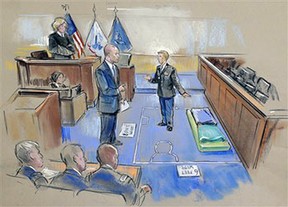 There was no sunlight in the cell. No way of knowing if it was day or night. Just a fluorescent light which illuminated him 24/7, and another in the corridor outside, which shone into his eyes as he tried to sleep.
There was no sunlight in the cell. No way of knowing if it was day or night. Just a fluorescent light which illuminated him 24/7, and another in the corridor outside, which shone into his eyes as he tried to sleep.
He couldn't turn away. The personnel at the observation desk opposite needed to see Bradley's face at all times.
If he pressed his cheeks far enough against the bars, there was a spot just down the corridor, where a reflection of a reflection might provide a notion of daylight. He was in this cell for at least 23 and a half hours a day.
It was 6ft by 8ft with a metal rack bed fastened to the wall and floor. The mattress had a pillow stitched into it. It could not be moved. A toilet sat alongside where his head would rest, with a sink adjacent to that. He was given an abrasive blanket, which scratched his skin and caused a rash. This was Bradley Manning's world.
Because he was technically still on duty, Manning was not allowed to lie down upon the bed during the hours of 05:00 and 17:00 hours. He had to stand to attention, or sit in a certain position. Upright, formal. Occasionally, he perched cross-legged on the edge of the bed. It was unauthorized and it could get him into trouble.
Every five minutes, a Brig Officer would appear at the cell door. It was routine and regulatory. "Are you alright?" He or she would ask. It was required that he respond, "Yes, Sir" or 'Yes, Ma'am."
For twenty minutes every day, he was allocated exercise and shower time. On these occasions, he was escorted outside in chains.
But for the most part he sat on the edge of his bed, feet towards the observation desk, face on view. At first, they took his glasses away, but that rendered him nearly blind. The prisoner's manual given to him to learn the rules had to be held close to his eyes. It obscured his face, so they gave him back his glasses.
When his clothes were taken away, he was given a suicide smock to wear. It was heavy and cumbersome, once actually trapping his arms inside it. A corporal had to come and free him from its bondage.
At night, he slept naked, beneath the abrasive blanket.


 For all the talk of torture and mental breakdowns, Bradley Manning appeared calm, energetic, intelligent and in good spirits, as he took the stand at Fort Meade.
For all the talk of torture and mental breakdowns, Bradley Manning appeared calm, energetic, intelligent and in good spirits, as he took the stand at Fort Meade.
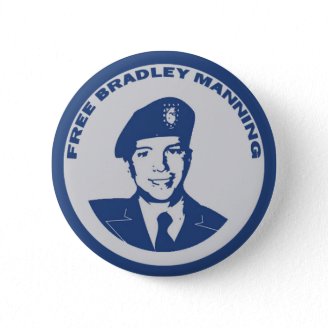
 During his months in Quantico, Bradley Manning was allowed some select visitors. It wasn't always to his advantage.
During his months in Quantico, Bradley Manning was allowed some select visitors. It wasn't always to his advantage.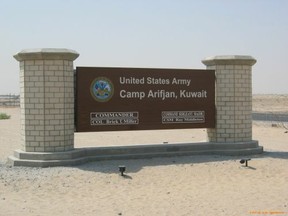 Bradley Manning was arrested on May 27th, 2010, after hacker Adrian Lamo turned to the FBI with information. Namely that the teenager may be behind
Bradley Manning was arrested on May 27th, 2010, after hacker Adrian Lamo turned to the FBI with information. Namely that the teenager may be behind 
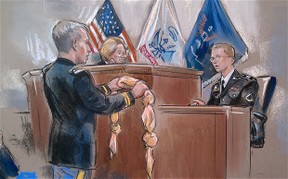 If the heat and darkness were physically draining, then the psychological trauma was worse.
If the heat and darkness were physically draining, then the psychological trauma was worse.


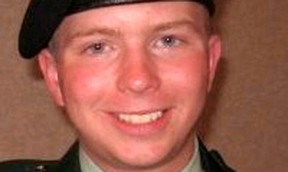 By the evening he reached Quantico, Bradley Manning had slept for only 90 minutes in over twenty-four hours. He was exhausted, confused and uncomfortable, but also relieved to be on American soil.
By the evening he reached Quantico, Bradley Manning had slept for only 90 minutes in over twenty-four hours. He was exhausted, confused and uncomfortable, but also relieved to be on American soil.

 There was no sunlight in the cell. No way of knowing if it was day or night. Just a fluorescent light which illuminated him 24/7, and another in the corridor outside, which shone into his eyes as he tried to sleep.
There was no sunlight in the cell. No way of knowing if it was day or night. Just a fluorescent light which illuminated him 24/7, and another in the corridor outside, which shone into his eyes as he tried to sleep.



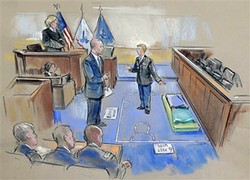

 St Tydecho's Churches in West Waleson 09/03/2014
St Tydecho's Churches in West Waleson 09/03/2014
 Goodies for an Outlander Premiere Partyon 03/06/2015
Goodies for an Outlander Premiere Partyon 03/06/2015
 Holocaust Memorial Day Interview with Rainer Höss, Grandson of Rudolf Architect of Auschwitzon 01/24/2015
Holocaust Memorial Day Interview with Rainer Höss, Grandson of Rudolf Architect of Auschwitzon 01/24/2015
 Romantic Valentine Gifts for an Outlander Fanon 01/16/2015
Romantic Valentine Gifts for an Outlander Fanon 01/16/2015



What are your thoughts on the third day's findings?
You're very welcome. I'm very behind on these articles myself, but I hope to get caught up soon.
Wow, I can't believe such things are actually allowed to happen. I have been keeping up as best as I can. Thanks for keeping us up to date.
You're very welcome. I'm aware that I'm very behind on these. He's on day nine and I've only written to day three so far. I plan to rectify that before the end of the week.
Thank you for reading.
unbelievable. Thanks for keeping us posted on this one
I'm in agreement here. Thank you for commenting.
It's awful how they treated him. Free Bradley Manning!
The UN Special Rapporteur on Torture totally disagreed on their assessment.
And yep.
So, after they humiliated him, isolated him from loved ones and deprived him of sleep for who knows how long, they offered him what can only be described as a straight jacket when he refused to admit to suicidal tendencies. And they honestly believe that because he was 'only' harmed psychologically, it could never be considered real torture.